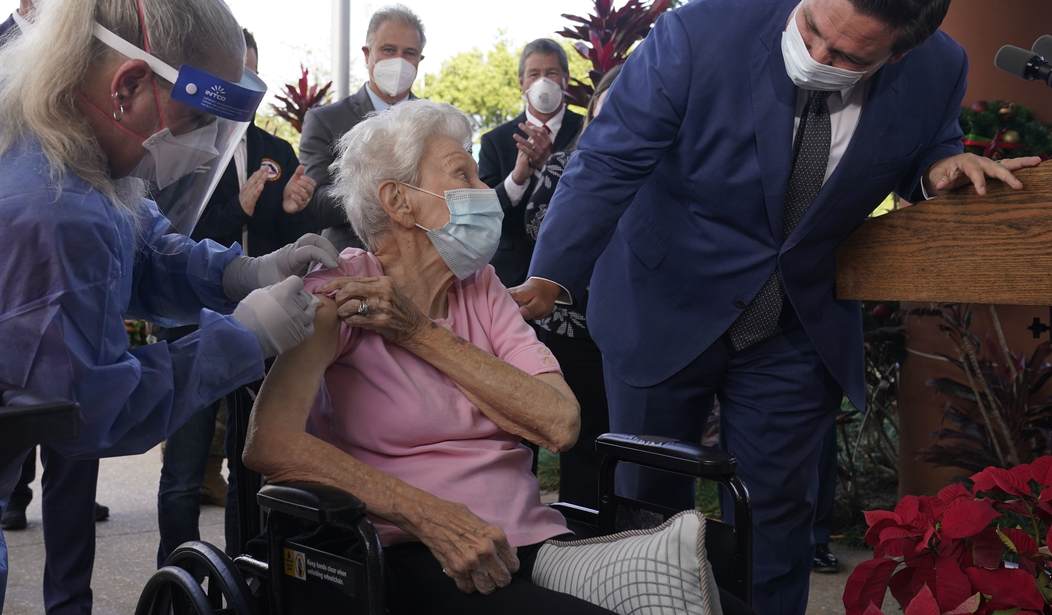How durable? Durable enough that otherwise healthy people might not need a booster unless and until there’s a diabolical new variant capable of punching through the current vaccines. Immunity against the current variants shouldn’t fade, if this new study is accurate. If the B.1.617 “Delta” strain is as bad as SARS-CoV-2 gets, those of us who’ve been vaccinated might truly be done with preventive measures.
And those who’ve recovered from COVID and then gotten vaccinated may have so much damned immunity that they won’t need a booster even if something scarier comes down the pike.
This Times story is a sequel to one from last month about a study of people who had the virus and later got vaxxed. Scientists who examined their immune response found that the “memory B cells” produced by infection and later boosted by a dose of vaccine were extremely potent. Not only that, but those B cells evolved over time, proving that the body’s defenses might be as adaptable as the virus itself is. And even people who’d been infected and didn’t get vaccinated later still had some natural immunity from SARS-CoV-2 a year later.
All of that pointed to immunity from vaccination alone lasting a long time but scientists wanted to confirm it. How long would memory B cells, which “remember” a particular germ so that the body can repel it more easily if it ever invades again, last in those who’ve had both their shots but never had COVID? The result: A surprisingly long time, possibly a lifetime.
Dr. Ellebedy and his colleagues recruited 41 people — including eight with a history of infection with the virus — who were immunized with two doses of the Pfizer-BioNTech vaccine. From 14 of these people, the team extracted samples from the lymph nodes at three, four, five, seven and 15 weeks after the first dose…
Dr. Ellebedy’s team found that 15 weeks after the first dose of vaccine, the germinal center was still highly active in all 14 of the participants, and that the number of memory cells that recognized the coronavirus had not declined.
“The fact that the reactions continued for almost four months after vaccination — that’s a very, very good sign,” Dr. Ellebedy said. Germinal centers typically peak one to two weeks after immunization, and then wane.
“Usually by four to six weeks, there’s not much left,” said Deepta Bhattacharya, an immunologist at the University of Arizona. But germinal centers stimulated by the mRNA vaccines are “still going, months into it, and not a lot of decline in most people.”
The germinal center, which is found in the lymph nodes of vaccinated people, is the place where B cells “train” to recognize different viral sequences. The longer they train, the more knowledge they acquire; they “evolve” just as the virus does in the wild. The result from this study indicates that they’re training for an unusually long time, educating the immune system to recognize and attack an increasingly diverse array of permutations of SARS-CoV-2. By the time the virus figures out a new combination that might have broken through your immunity six months ago, your body may have already cracked the code on that combination and be in a position to fend it off.
And if we end up encountering a super-variant that’s evolved a little more rapidly than the average person’s B cells have, that’s where the boosters come in.
Which raises a question: Which booster will it be? Do Pfizer people get a third shot of Pfizer or is mix-and-match the way to go, in the hope that different vaccines might generate an even more diverse immune response? Scientists are testing that as we speak with AstraZeneca and Pfizer.
The Com-Cov study, which looked at giving the doses four weeks apart in 850 volunteers aged 50 and above, found:
AZ followed by Pfizer induced higher antibodies and T cell responses than Pfizer followed by AZ
Both of these mixes induced higher antibodies than two doses of AZ
The highest antibody response was seen after two doses of Pfizer, and the highest T cell response from AZ followed by Pfizer
Novavax is another possibility for a mix-and-match booster as it’s cracked up to have fewer side effects than a third dose of an mRNA vaccine might. But the point of the Times story is that it might be unnecessary after all, at least for people under 65 in good health. For senior citizens, a little extra help to keep the immune system primed might be in order.
As for the lingering mystery of whether natural immunity or vaccine immunity is better, there seems little question right now that mix-and-match is the way to go there too if possible. But between one or the other, the Times quotes the lead researcher on today’s study as saying vaccine immunity is “probably” better because the shots elicit a more diverse set of antibodies. If you’ve recovered from COVID and you’ve taken the Rand Paul position that you therefore don’t need to be vaccinated, you’re facing the future of the virus with what’s probably the weakest form of immunity. Whereas getting jabbed and boosting your natural immunity with vaccine immunity would give you the strongest form, to the point where you may never need another shot for COVID.








Join the conversation as a VIP Member